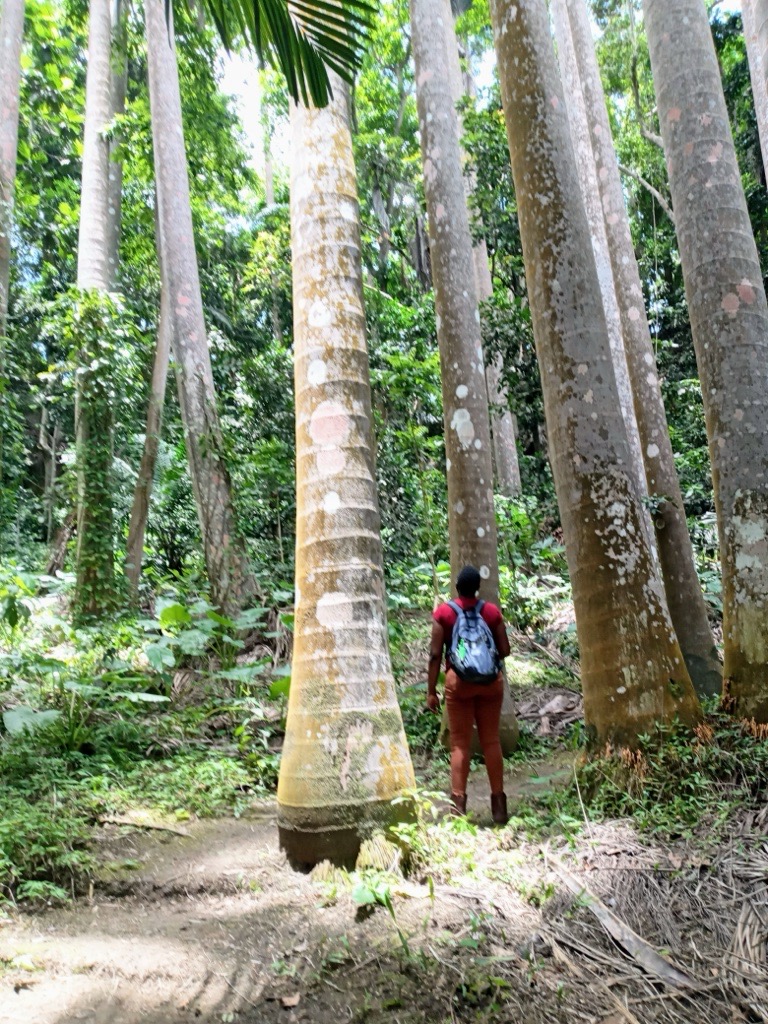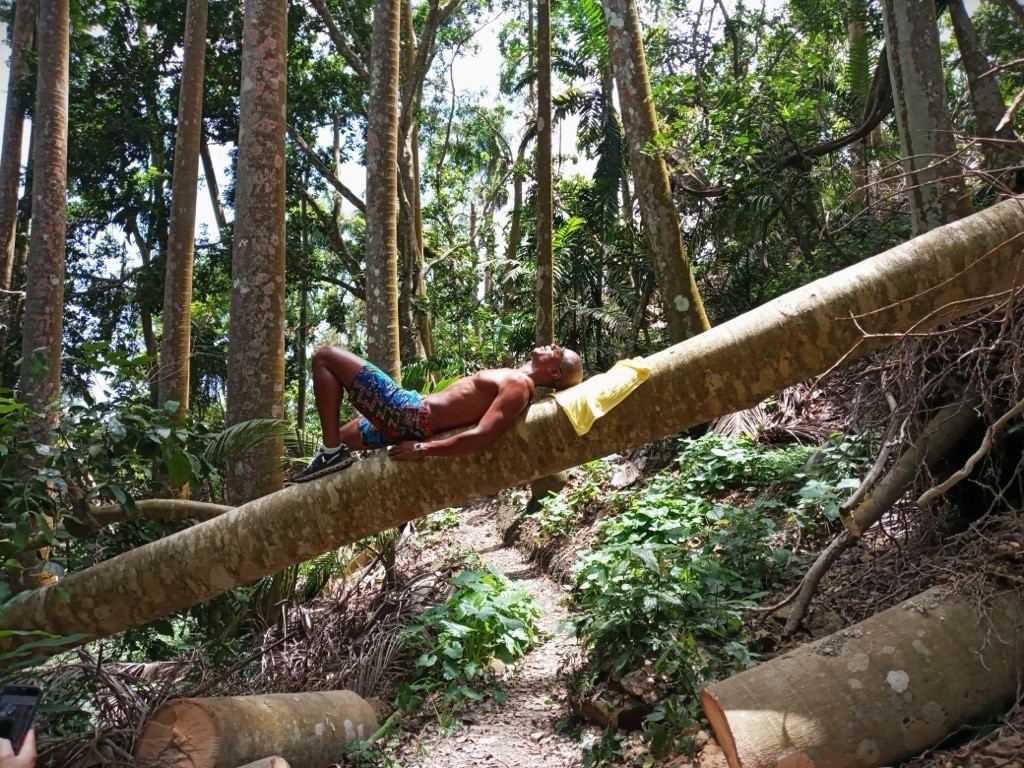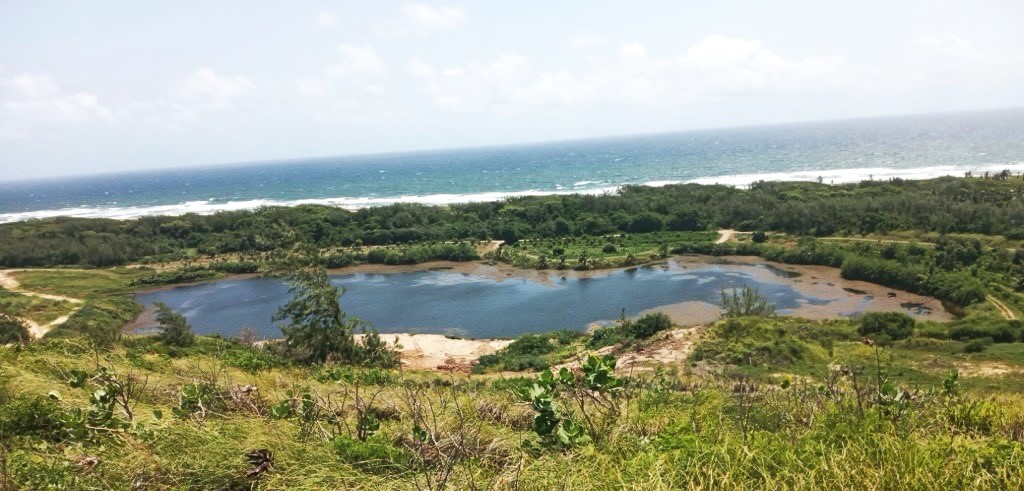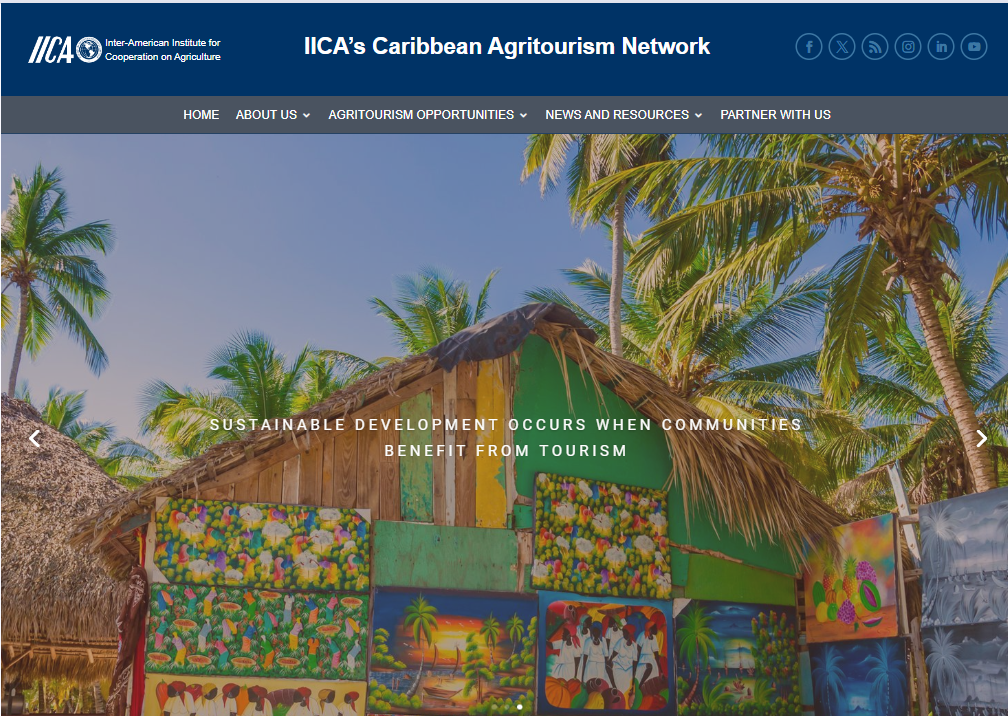As the world gears up for the 2nd World Agritourism Congress, set to unfold from May 16 to 18, 2024 in the picturesque landscapes of Italy with convenient online access, we at IICA are thrilled to dive into the agritourism conversation, highlighting the vibrant Caribbean. Recognized for its tourism-driven economies, this area presents significant prospects for linking tourism with the agricultural sector.
Our spotlight falls on Barbados, known for its paradisiacal beaches and rich cultural heritage. Traditionally a haven for tourists seeking sun, sand, and sea, the island's appeal has expanded to encompass its culinary treasures and locally crafted rum. Yet, amidst this transformation, questions arise regarding the sustainability of Barbados' food production.

Coco Hill. Photo by R. Waithe
How can the island maintain a sustainable supply of food while catering to the demands of both its local population and the expanding tourism sector?
In a recent report from the Central Bank of Barbados (2022), it was highlighted how tourism has been instrumental in driving the island's economic recovery post-COVID-19. The tourism sector contributed a staggering BDS$508.2 million to economic activity during the first nine months of 2022 alone. This surge in tourism not only boosted Barbados' GDP significantly, jumping from -0.8 percent in 2021 to an impressive 11.3 percent in 2022, but also saw an astounding 273% increase in visitor numbers.
However, alongside this growth, there's been a notable surge in Barbados’ food and beverage import bill. In 2022, this sum reached BDS$817 million, up from BDS$653.6 million in the previous year. This trend underscores the pressing need to bolster local food production to reduce dependency on imports and ensure food security.
|
“Despite increased demand, Barbados' agriculture sector has struggled to fully recover from the impact of adverse weather conditions and rising input costs.” |
Despite increased demand, Barbados' agriculture sector has struggled to fully recover from the impact of adverse weather conditions and rising input costs, as highlighted by the World Bank in 2023. Local farmers face stiff competition from large multinational corporations, hindering their ability to achieve economies of scale and leading to a reliance on imported, processed foods. In response, Prime Minister Mia Mottley's administration has initiated ambitious plans to reduce food and energy dependence as part of Barbados' sustainable development strategy.
One promising avenue for addressing these challenges lies in sustainable agritourism. By forging a deeper connection between tourists and local food sources, agritourism offers a pathway towards sustainable development. The renowned Oistins Fish Fry serves as a prime example of a community-based agritourism experience. While the food is a major attraction, visitors can also find a variety of arts and crafts for sale, such as jewelry, pottery, ceramics, leatherwork, wood carvings, straw crafts, clothing, accessories, and original paintings and prints. Moreover, there exists significant potential to enrich the visitor experience by providing deeper insights into the daily lives of farmers and highlighting traditional agricultural practices.

Coco Hill. Photo by R. Waithe
Other local champions in Barbados are actively contributing to the island's journey towards becoming a sustainable tourism destination by focusing on regenerative agriculture practices. Leading the charge in sustainable agritourism initiatives is Coco Hill Forest, a 53-acre agrotourism site that integrates tourism with agriculture, agro-processing, renewable energy and culture. Visitors to Coco Hill can explore hiking trails, participate in yoga sessions, and even enjoy moonlight hikes and glamping experiences.
Another initiative that showcases Barbados' dedication to sustainable agriculture is The Walkers Institute for Regenerative Research and Design (WIRRED). At Walker's Reserve, which serves as a living laboratory for regenerative farming practices, visitors witness firsthand the transformation of a former sand quarry. Once mined for construction materials in Barbados, this area is now undergoing sculpting, planting, and regeneration efforts aimed at boosting biodiversity and fostering sustainable ecosystems. A trip to Walker's Reserve offers opportunities for nature walks, hikes, bird-watching, farmers' markets, and workshops covering topics such as apiculture, art, and permaculture.

WIRRED. Photo by R. Waithe
|
“Smallholder farmers stand to benefit greatly from technical and financial support to embrace innovative techniques such as agroforestry, organic farming, and permaculture.” |
Although these initiatives are praiseworthy, it is crucial to ensure that smallholder farmers are not left behind. These farmers stand to benefit greatly from technical and financial support to embrace innovative techniques such as agroforestry, organic farming, and permaculture. By embracing regenerative agriculture practices, smallholder farmers can reduce production costs, enhance their incomes, and contribute to a more sustainable future for Barbados. Furthermore, to unlock the full potential of sustainable agritourism, Barbados must establish a supportive policy framework. This framework should be crafted in collaboration with farmers, offering incentives for both growers and agritourism operators to embrace regenerative practices.
IICA's Efforts in Advancing Caribbean Agritourism
The Inter-American Institute for Cooperation on Agriculture (IICA) has long supported the development of agriculture and rural communities in the region. Recently, IICA offices from various Caribbean nations, including Barbados, along with the United States, Mexico, and Canada, have joined forces to establish the IICA's Caribbean Agritourism Network (ICAN). This collaborative effort is dedicated to fostering agritourism growth across the region by facilitating connections between the tourism and agriculture sectors, showcasing and promoting existing agritourism initiatives, enhancing the capabilities of diverse stakeholders—government, industry and communities—to invest in and expand agritourism activities, developing and advocating for policies that encourage agritourism growth, and providing technical assistance and training to small farmers and other agritourism stakeholders. A pivotal aspect of this initiative is the Caribbean Agritourism Network website, which serves as a central hub for resources, connections, and educational materials tailored to agritourism enthusiasts and entrepreneurs.
IICA's extensive experience supporting the development of agriculture and rural communities in the region provides a valuable example of agriculture's transformative power as the world looks to the future of sustainable agritourism. It emphasizes the importance of integrating farmers into strong value chains and enhancing the value of natural and agrifood resources throughout rural communities.
 Visit: IICA’s Caribbean Agritourism Network (ICAN), https://agritourism.iica.int/
Visit: IICA’s Caribbean Agritourism Network (ICAN), https://agritourism.iica.int/
Preparing for the Upcoming 2nd World Agritourism Congress
As we conclude our exploration of agritourism's potential in Barbados and IICA’s efforts to develop and strengthen agritourism initiatives, our attention is once again drawn to the significant opportunity presented by the upcoming 2nd World Agritourism Congress organized by the Global Agritourism Network (GAN). This global event, set for May 16 to 18, 2024, underscores the growing international recognition of agritourism's importance and it offers stakeholders from Barbados and other Caribbean nations a platform to gain valuable insights and inspiration. With abundant natural resources and a rich agricultural heritage, the Caribbean is perfectly situated to capitalize on agritourism's transformative potential.
Policymakers, farmers, and stakeholders alike are encouraged to take part in this global dialogue, as we collectively strive to create a more sustainable and prosperous future for agritourism, both in the Caribbean and around the world.
References
Central Bank of Barbados 2023. Review of Barbados’ Economic Performance. Available at: www.centralbank.org.bb/viewPDF/documents/2024-01-31-13-23-06-Central-Bank-of-Barbados-Review-of-Barbados-Economy-in-2023.pdf
World Bank 2023. Barbados MPO. Available at: https://thedocs.worldbank.org/en/doc/e408a7e21ba62d843bdd90dc37e61b57-0500032021/related/mpo-brb.pdf
.........................................................
About IICA
The Inter-American Institute for Cooperation on Agriculture (IICA) is the specialized agency for agriculture of the Inter-American System that supports the efforts of Member States to achieve agricultural development and rural well-being. Established in 1942, IICA has a long history of supporting the development of agriculture and rural communities in the region. In the field of agritourism, IICA has over 20 years of experience connecting local farmers with hotels and restaurants to integrate farmers into strong value chains, as well as designing competitive tourism products that increase the value of natural and agrifood resources on farms and throughout the rural community.
About the author
 Dr. Roxanne Waithe is the Technical Specialist for the IICA Office in Barbados. She provides expertise in the field of training and certification for persons at all levels involved in the agrifood sector, has proven experience in developing and managing national and regional projects, and also works with agritourism and climate change programmes. She is an active member of IICA’s Caribbean Agritourism Network.
Dr. Roxanne Waithe is the Technical Specialist for the IICA Office in Barbados. She provides expertise in the field of training and certification for persons at all levels involved in the agrifood sector, has proven experience in developing and managing national and regional projects, and also works with agritourism and climate change programmes. She is an active member of IICA’s Caribbean Agritourism Network.
Editor: Vivian Arguelles, Technical Specialist at IICA Canada and coordinating member of IICA’s Caribbean Agritourism Network.
The opinions expressed in this article are the responsibility of the author and do not necessarily reflect the opinion of IICA.
|
If you have questions or suggestions for improving the BlogIICA, please write to the editors: Joaquín Arias and Eugenia Salazar. |
Add new comment